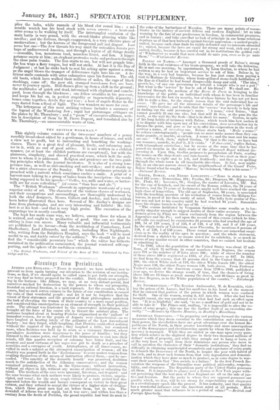THE BRITISH WORKMAN.*
This sightly volume consists of the two-years' numbers of a penny monthly broad-sheet edited by a gentleman, in hours of leisure, and with a view not to profit, but to instructing and benefiting the workingclasses. There is a great deal of pleasant, lively, and informing matter in it, with no end of good advice. It is not written in a childish manner, (or at least the childish portions are exceptional), but with the plainness, simplicity, and shrewd practical sense, which befit the audience to whom it is addressed. Religion and prudence are the two guiding principles which the journal inculcates. It is also of a strong temperance tone, as well as anti-smoking and anti-strikes ; and it stands up for a strict observance of the Sunday. The total-abstinence principle is preached with a nal-vete which sometimes excites a smile. A print of a harvest-man talking to a group of ladies bears the inscription—the words being supposed to be his speech—" Coffee, tea, milk and water, or buttermilk are for more refreshing" (of course "than beer and ale.")
The "British Workman" abounds in appropriate wood-cuts of a very superior order of art. The character of the various classes of workmen, and their occupations and surroundings, are thoroughly understood by both the chief designers, Messrs. Gilbert and Anelay, and have seldom been better illustrated than here. Several of Mr. Anelay's designs are done from photographs, and are very interesting and faithful Mr. Gilbert is at his best—and that is very high praise. The execution of the engravings too is mostly excellent.
The book has made some way, we believe, among those for whom it is writter!, and ought to be productive of good. One can see that the editing is done con amore. Many valuable and influential testimonials are published in its favour—from the Archbishop of Canterbury, Lord Shaftesbury, Lord Albemarle, and others, including Miss Nightingale, who, writing from the Balaklava Hospital, says the book "will be most useful to us, and highly valued by the soldiers." We should be glad to find the " considerable pecuniary loss" which the editor has hitherto sustained in the publication surmounted, the journal rendered self-supporting, and the sphere of its usefulness extended.
The Briti47 Workman, and Friend of the Sons of Toil. Published by Partridge and Co.


































 Previous page
Previous page